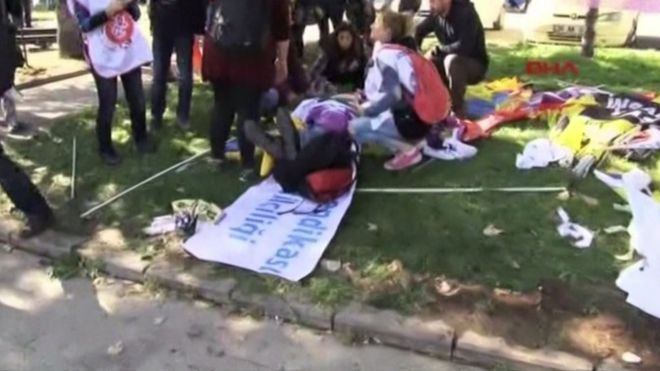
Two explosions at a peace rally in the Turkish capital Ankara have killed at least 86 people and injured 186, according to officials. TV footage shows scenes of panic and people lying on the ground covered in blood, amid protest banners. The blasts took place near the city’s central train station as people gathered for a march organised by leftist groups. Turkey’s president condemned the attacks as “terrorist acts”. Government officials are investigating reports that a suicide bomber was behind at least one of the explosions. Who are the Kurds? The pro-Kurdish HDP party was among those attending the rally, which was demanding an end to the violence between the Kurdish separatist PKK militants and the Turkish government. The party said in a statement that it believes its members were the main target of the bombings. The leader of the HDP has blamed the state for the attack, which he called “a huge massacre”, and cancelled all election rallies. Turkey is holding a re-run of June’s inconclusive parliamentary elections on 1 November. Later on Saturday, the PKK called on its fighters to halt its guerrilla activities in Turkey unless attacked first, according to reports on a news site close to the group. The HDP was among those joining Saturday’s rally for “peace and democracy”, called for by the confederation of trades unions, which was due to start at 12:00 local time. The two explosions happened shortly after 10:00 as crowds gathered ahead of the rally. Amateur video footage showed a group of young people holding hands and singing, before the first blast. The HDP tweeted that police “attacked” people carrying the injured away. Opposition MP Musa Cam tweeted a photo of a ball bearing he says he found at the scene. Analysis: Mark Lowen, BBC News, Istanbul After the ceasefire between the PKK and the Turkish state broke down in July, Turkey has spiralled into tit-for-tat attacks between the two sides, and tension between Kurds and Turkish nationalists has soared. Amidst the frenzy of a repeat election in November, it was expected that something dangerous was imminent. The pro-Kurdish HDP party has blamed the state. That is undoubtedly a reference to the so-called “deep state” often talked about here: a shady mix of nationalist forces either colluding with or supporting the government in power. The West’s vital ally in the Middle East is now facing a perfect storm: deep political polarisation, the bubble of economic success on the brink of bursting, a resumption of violence with the PKK, the threat from Islamic State, and two million Syrian refugees and counting. The tragedy in Ankara is a sign of the dark times Turkey is now facing. Bulent Tekdemir, who was at the rally, told the BBC that the police used tear gas “as soon as the bomb went off”, and “would not let ambulances through”. Local resident Emre said he heard two separate explosions and saw a number of dead bodies. Angry people tried to attack police cars, he told the BBC. — bbc.com

